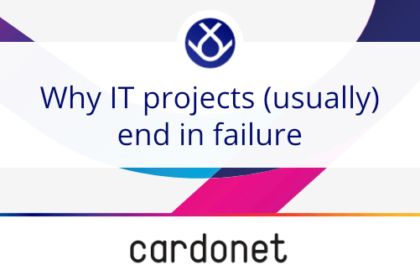
If you are finding that your IT projects seem destined for failure, don’t worry – you’re not alone. According to a Harvard Business Review study, the average IT project runs 27% over budget. That’s not even the most frightening part: one in six ends up costing more than double the initial budget, as well as taking 70% more time than anticipated.
Whether you are automating a warehouse or just rolling out a few new computers, there are many upsides to a well-managed digital transformation project. Here are a few common mistakes that could cause your project to bomb.
You don’t have a clear vision
What is the goal of your project? You should be able to explain why the project is being undertaken in the first place: what problem is it solving, and for who? You should also be clear on why you’re doing it this way instead of another.
If you can’t answer these questions and aren’t clear on what the completed project should look like, it will lack direction. Without direction, you are unlikely to solve the problem that gave rise to the project in the first place.
This vision should be shared by the managers overseeing the project as well as the team implementing it. Their goals should be aligned, and they should share a sense of what success looks like.
You should be driven with the end-user in mind. Does this make their lives easier? Does it allow them to work more effectively?
You answer the wrong question
One of the biggest risks that comes with no clear vision is that you try to solve the wrong problem. Or, you might find a solution where no problem exists at all.
Let’s say John feels his business’ digital capability is lagging behind competitors. He decides to make the move to a cloud environment.
But the project is a failure: the IT team does not have the skills to implement the move in the first place and the rest of his staff find the new system too complex to use. What went wrong?
John answered the wrong question. The business’ lack of digital capability is not the fault of one outdated technology, but rather due to a general lack of IT competency. His solution caused more harm than benefit.
When you solve the wrong problem, the best-case scenario is that you suffer an opportunity cost. You’ve used resources to solve a non-issue when you could have used them to solve an actual problem.
The worst-case scenario is that you’ve created more problems than you started out with. Your changes are unwanted and arbitrary, and make the processes more complicated rather than less.
You lack a plan
To carry out an IT project effectively you need to keep track of many moving parts.
We at Cardonet know this first-hand. When we partner with a new hotel, it’s like balancing plates. We need to ensure that the various technology vendors are delivering on time, to the right standard, as well as overseeing the installation and maintenance of internet connectivity by the ISP.
The need for proper project management has only increased with the recent supply chain pressures.
If those implementing the project don’t know what needs to be done by when, and which milestones need to be met in order to get there, it is unlikely that they will be able to execute it well.
The longer your project is going to take, the more time there is for things to go wrong. You need a timeline which reflects the actual needs of the project.
If you know that your project needs five months, but you agree to complete it in three, then one of two things are likely to happen. You may complete it in the allocated three months, but it won’t be up to scratch and no one will want to use it.
On the other hand, you may get it done to the expected standard, at the cost of a delayed project (read: an upset client or other stakeholders).
You can be confident that your schedule will add value if it has:
- Clear milestones
- Realistic objectives
- An accurate account of resources available
Your team can’t execute the project
Now that you have a clear vision of what you want, and a roadmap of how to get there, you’ve built the foundations of a good project. But you aren’t out of the woods yet. You need people to make the project happen.
Your team needs the right skill-set and experience. If they are unfamiliar with the necessary technology the learning curve will be steep and may delay the project.
Likewise, if they do not have sufficient technical know-how, they won’t be able to carry out the project nor teach the end-user how to take full advantage of it.
Alongside capable IT staff, it helps to have a team that is open to technology. If they welcome change and support innovation, they will buy-in to IT projects more often and with more eagerness.
On the other hand, a change-hesitant team will hinder the project.
You lack effective communication
Effective communication is needed at every step of the process in an IT project.
While last on this list, it is certainly not the least important. In fact, poor communication will make each of the previous points even more likely to exacerbate failure.
Management needs to communicate what they want from the project, what its objectives are, and by what benchmarks its success will be measured against.
Throughout the project, the team implementing it needs to communicate with each other, to ensure that it is coming along as expected and to schedule.
The IT department, or whoever is carrying out the project, needs to communicate to the end-user. How do they make use of the new technology, and what is its value?
In many cases, this is the most important. The technology itself may be easy enough for your technology team to install, but they must also empower the rest of the staff to make use of it.
IT may be able to roll out new PCs in their sleep, but firm your team may not have such ease using them.
Do you need help making your IT project a success?
Acute challenges face IT projects. That being said, effective and successful IT projects should be a key part of your business’ strategy.
Done right, it could solve a problem that’s been niggling one of your teams, or free up valuable time by optimising a process.
We at Cardonet have a great track-record for implementing successful IT projects. If you are worried that your team is not able to carry out an effective project, do not hesitate to contact us. In addition to executing successful IT projects, we can help you decide what kind of project best suits your business needs. We can help you find out where your IT weak spots are and how to remedy them.
If you would like to find out more about how we could support your IT Project, please call us on +44 203 034 2244 or +1 323 984 8908. Alternatively, you can contact us online. We will be happy to help you make your IT Project effective and successful. We have engineering bases in the United Kingdom, Europe and Southern California and our group of highly experienced engineers are available 24/7.



You must be logged in to post a comment.